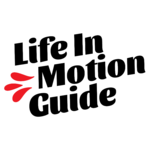Preparing Our People
If someone is going to have your back in an emergency, they're going to need certain information in order to be effective.
You’ve already shared a copy of your advance directives with your medical and financial decision makers. Now share the information they need to represent you!
Your medical decision maker will need to know about your:
NOTE: If you have a Life in Motion Guide, you can document all of this in the Health section of the book. If you don’t have one, no problem. Just write the information on paper or in your favorite note-taking application.
Your financial decision maker will need to know anything relevant to your finances, your property, and any legal obligations you may have. Examples include:
If you own a business, the same applies. Though your decision maker may be different than for your personal life, someone besides you needs to know how your business runs (and have permission to step in if you are incapacitated.)
NOTE: This can all be documented in the Financial and Property sections of the Life in Motion Guide. Again, no problem if you don’t have one. Just write the information on paper or in your favorite note-taking application.
You Don’t Have to Share All the Details
You don’t have to share everything at once or share all of the details with your decision makers. The important thing is that someone have access to the necessary information in case of emergency...not at all times.
Common Challenges
I don't want my mom/wife/husband/child to know what medication I take...
You're not alone. Lots of people don't want to share this kind of information, even with loved ones and trusted friends. Here are some options if you want this information kept private but still accessible in an emergency:
My medical and financial decision makers are different people…
This is common. Different family members might be better suited for different roles and sometimes people choose to have different financial and medical decision makers. In these cases, I recommend getting your "team" together and explaining how they'll need to work together. They may need to share information in order to ensure you get the best care, and both will benefit from knowing what your preferences are ahead of time.
This seems like a lot of detail. I'm not really into details…
That's fair. It is hard to motivate to get all this information in one place. But if it's too hard for you to take care of this, woudn't it be even harder for someone else to parachute into your arcane life management system without a guide?
Break it down and do a little each day this week.
New here? Start your Peace of Mind Plan from the beginning.
Copyright 2020 Pressure Drop LLC | Terms of Service | Privacy Policy | Disclaimer
